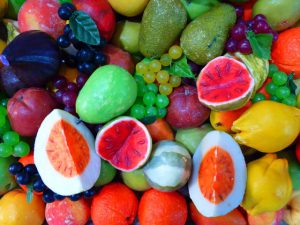How Fruits and Vegetables are important for the diet?
June 6, 2018
The presence of Fruits and vegetables is very important in our daily life.

They contain a huge amount of vitamins and minerals that helps the body to remain healthy.
A huge number vitamins and minerals are contained in fruits and vegetables that are good for the health.
Vitamins include Vitamin A (beta-carotene), Vitamin C and Vitamin E, magnesium, zinc, phosphorus and folic acid. Folic acid helps in reducing blood levels of homo cysteine. It is a substance which is a risk factor for coronary heart disease.
The biggest advantage of having fruits and vegetables is that they are low in fat, salt and sugar. They are the best source of dietary fiber.
Taking fruits and vegetables as a part of our well balanced and regular diet and a healthy and active lifestyle might help us to:
- Reduce obesity and to maintain a healthy weight
- Lower cholesterol
- Lower the blood pressure
Fruits and Vegetables also contain phytochemicals or plant chemicals. These are biologically active substances which help us to protect from certain number of diseases. It is scientifically proven that if we eat lots of fruits and vegetables then there are lower risks of having:
- Type 2 diabetes
- stroke
- Heart or cardiovascular disease- when fruits and vegetables are taken as food instead of taking it as a supplement.
- Cancer- probability of having some forms of cancer later in the life.
- High blood pressure or Hypertension.
Fruits are the sweet, fleshy and edible part of a plant and can be eaten raw or sometimes cooked.
There are a wide variety of colours and flavours available. The common types of fruits which are readily available are:
- Apples and pears
- citrus fruits – oranges, grapefruits
- stone fruits- peaches, plums
- Tropical and exotic- bananas, mangoes
- Berries- strawberries, kiwifruit
- Melons- watermelon, rockmelon
- Tomatoes and avocados
There are also various types of vegetables available nowadays which are classified according to their biological families such as:
- Leafy green- lettuce, spinach
- Cruciferous- cabbage, cauliflower
- Marrow- pumpkin, cucumber
- root- potato, yam
- edible plant system- celery and asparagus
- Allium- onion, garlic
RECENT BLOGS
- Post-Heart Surgery Care: Essential Tips for Faster Recovery and Better Heart Health
- Physiotherapy in Healthcare: Why It’s Essential for Post-Operative Recovery
- A Complete Guide to Ultrasonography: Procedure, Benefits, and Applicationss
- The Complete Guide to Pulmonary Function Tests: Preparing, Procedure, and Results
- Breathing Easy: Simple Habits for Better Lung Health and Wellness
- Understanding Asthma: Symptoms, Triggers, and How to Manage It Effectively
- Recognizing a Heart Attack: Early Symptoms and Immediate Steps to Take
- CT Scans: Everything You Need to Know – Procedure, Precautions, and How They Help Your Health
- Choosing the Right Hospital: What Patients Need to Know for Better Healthcare
- The Journey to Better Digestive Health: Identifying Issues with Gastroscopy
- Simple Food Habits to Boost Your Immune System and Respiratory Health
- The Importance of Regular Health Screenings for Heart Disease Prevention
- Fit for Life: The Health Benefits of Regular Exercise for Everyone
- Living with Pulmonary Hypertension: Managing Symptoms and Improving Quality of Life
- Exploring the Lifelong Benefits of Physical Activity on Heart Health
- The Role of CT Scans in Diagnosing Respiratory Conditions: What Patients Need to Know
- Unlocking the Benefits of Regular Physical Activity for Heart Health
- The Role of Diet in Asthma Management: Foods to Eat and Avoid
- The Role of CT Scans in Diagnosing Respiratory Disorders
- How to Prepare for Thoracic Surgery: A Patient’s Guide
- BreatheWell Insights: Navigating Respiratory Health with Santosham Chest Hospital
- Gastroscopy Demystified: Your Essential Guide to Digestive Health
- Thoracic back pain treatment
- Quit smoking save your lungs – how to quit smoking?
- Asthma Symptoms and Treatments You Should Know
- Best Chest Hospital in India
- Exercises for COPD patients
- What To Expect At A Pulmonary Function Test
- Types of Asthma Medications
- Tips for keeping your lungs healthy
- Santosham Hospital- the best Pulmonology Hospital in India
- Guide to Gastroscopy - Symptoms & Procedure
- COPD - Know the Signs and Symptoms & Get the Facts
- Living with Pulmonary Hypertension
- Smoking and COPD Effects
- What You Need To Know About Asthma
- Side effects of eating too much choclate
- Top 4 Ways You Can Purify Your Lungs Naturally
- Rotational shifts are disrupting your metabolism
- How to survive heart attack when you’re alone?
- Tips for a Healthy Mind, Body And Spirit
- Seven Ways to Cut the Junk Food
- How Fruits and Vegetables are important for the diet?
- 5 reasons why walk is the best workout
- 7 benefits of eating healthy and exercising regularly
- 7 Best Exercise To Keep Your Heart Healthy Forever
- 10 Good Habits for Healthy Heart
- 10 Foods to Keep your Heart Healthy

